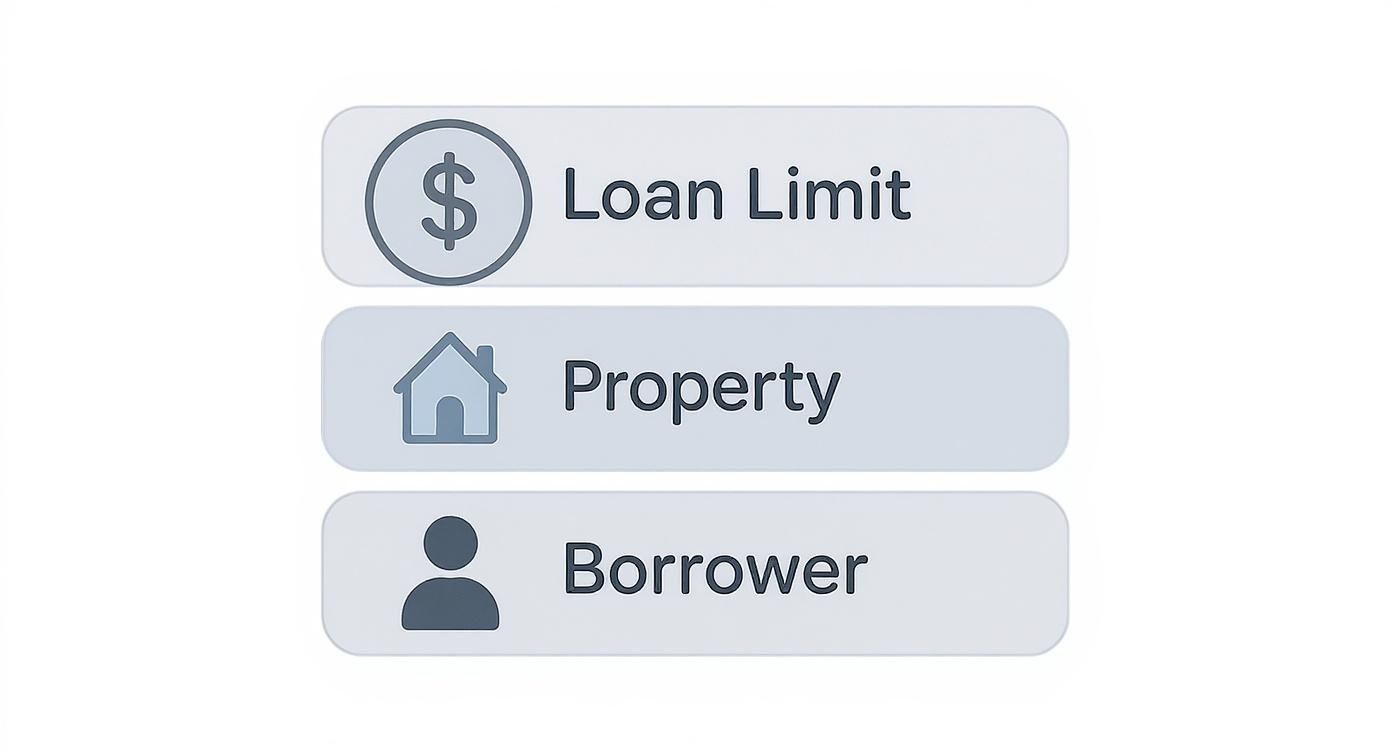So, what exactly is a jumbo loan? Put simply, it’s a mortgage that’s too large to fit into the standard lending box set by federal regulators.
If you’re shopping for a high-value property in a competitive market like Tampa, a jumbo loan is often the key to getting the financing you need—capital that a typical, or conforming, loan just can't provide.
Unlocking Tampa Real Estate with a Jumbo Loan
Let's ditch the confusing financial jargon for a minute. Imagine conforming loans are like the standard-sized parking spots at a stadium; they're perfect for most cars. A jumbo loan, on the other hand, is that special, oversized spot you need when you're driving something much bigger. It’s a loan specifically designed for higher-priced properties in the Tampa area.
This kind of specialized financing is absolutely essential in a hot real estate market like Tampa where home values often soar past the national average. For anyone dreaming of a luxury waterfront home on Tampa Bay, understanding the jumbo loan is the first step. These loans exist for one reason: to close the gap between what conventional loans can offer and the actual price of premium real estate.
What’s the Jumbo Loan Threshold?
A loan officially becomes "jumbo" when it exceeds the conforming loan limits set each year by the Federal Housing Finance Agency (FHFA). For 2025, that limit for a single-unit home in most of the U.S. is $806,500.
Anything above that number is considered a jumbo loan. Because these loans are "non-conforming," they can't be bought by government-backed giants like Fannie Mae and Freddie Mac. This small detail is a big deal—it means lenders take on more risk, which is why they usually have stricter qualification requirements than you’d find with a standard loan.
A jumbo loan’s real job is to offer flexible, substantial financing for properties that don’t fit into traditional lending molds. It’s an indispensable tool for buyers in high-cost markets like Tampa.
At Residential Acceptance Corporation (RAC Mortgage), we specialize in helping Tampa homebuyers navigate this unique financing landscape with confidence. We know the local market inside and out. To get a feel for all the possibilities, take a look at our various home loan programs.
How Jumbo Loans Differ from Conforming Loans
At first glance, the main thing separating a jumbo loan from a conforming one is the dollar amount. But when you look closer, the differences go much deeper, and understanding them is crucial for anyone looking to buy a high-value home in the Tampa area.
Think of it this way: a conforming loan is like taking your standard driver's license test. The rules are the same for everyone, set by a national standard. A jumbo loan, on the other hand, is more like getting a pilot's license. The stakes are much higher, so the training and evaluation are far more intense.
The Core Differences in Underwriting
The reason for the tougher standards is simple: risk. Conforming loans fall within the limits set by the Federal Housing Finance Agency (FHFA), which means they can be bought by giants like Fannie Mae and Freddie Mac. This creates a safety net for the original lender.
Jumbo loans, however, are too big for that. The lender who gives you the money, like Residential Acceptance Corporation, has to keep that loan on their own books, taking on all the risk themselves. To feel comfortable doing that, they need to be absolutely sure you can handle the payments.
This infographic gives you a quick visual breakdown of what makes a jumbo loan unique.

As you can see, these loans aren't just about bigger numbers. They're designed for financially solid borrowers purchasing specific types of properties. Let's really dig into what that means by comparing them side-by-side.
Jumbo Loan vs Conforming Loan at a Glance
Putting the two loan types next to each other really highlights the higher bar set for jumbo borrowers. Here’s a clear look at what lenders in Tampa will typically expect when you apply.
| Feature | Conforming Loan | Jumbo Loan |
|---|---|---|
| Loan Amount | Below the county limit (e.g., $806,500) | Above the county limit |
| Credit Score | Often 620+ | Typically 700+ is required |
| Down Payment | As low as 3% | Usually 10% to 20% or more |
| Cash Reserves | 2-6 months of mortgage payments | 6-12+ months of mortgage payments |
| Debt-to-Income (DTI) | Can be up to 50% | Generally capped at 43% or lower |
| Documentation | Standard income and asset verification | Extensive documentation of all financial assets |
This table shows that lenders are looking for more than just a good credit history; they want to see a comprehensive picture of financial strength.
One of the most important metrics here is the down payment, which directly impacts your loan-to-value (LTV) ratio. For a jumbo loan, lenders almost always want to see a lower LTV, meaning you’ll need to put more of your own money down. If you want to get a better handle on this key concept, check out our guide explaining the loan-to-value ratio and how it is calculated.
The Takeaway: Qualifying for a jumbo loan isn’t just about needing more money; it’s about proving you have a deeper level of financial stability across the board. This means a higher credit score, a lower debt load, and significantly more cash reserves.
At RAC Mortgage, we work with Tampa buyers every day to navigate these requirements. We’ll make sure you know exactly what’s needed to build the strongest possible application for the home you really want.
Qualifying for a Jumbo Loan in the Tampa Market

Getting approved for a jumbo loan in Tampa's competitive market isn't about ticking off a few boxes. It’s about building a compelling case for your financial stability. Think of it from the lender's perspective: these are massive loans that they hold on their own books, without the safety net from Fannie Mae or Freddie Mac.
Because lenders like Residential Acceptance Corporation are taking on all the risk, they need solid proof you can handle the responsibility long-term. This is why the underwriting process feels so much more intense than it does for a standard mortgage. They’re going to look at your entire financial history with a magnifying glass.
The Pillars of Jumbo Loan Qualification
So, what are lenders really looking for? You can boil it down to four core pillars that support your entire application. If one pillar is a little shaky, the others need to be rock-solid to make up for it.
- Excellent Credit Score: This is the big one. A high credit score is proof of your track record with managing debt responsibly.
- Low Debt-to-Income (DTI) Ratio: Lenders need to see that your existing debts won’t get in the way of making a substantial mortgage payment each month.
- Substantial Cash Reserves: Having plenty of liquid assets shows you can cover payments even if you hit a rough patch or have an unexpected income drop.
- Verifiable Income and Stable Employment: You need to prove, with clear documentation, that you have a consistent and reliable income stream.
Getting these elements in order is your first step. Each one tells a piece of your financial story, and together they create the full picture for the underwriter.
Diving Deeper into the Numbers
General advice is one thing, but the hard numbers are what really count. Jumbo loans have much stricter requirements than their conforming counterparts. Most Tampa lenders will want to see a credit score of at least 700 to 760.
When it comes to the down payment, expect to bring a minimum of 10% to the table, though 20% or more is far more common. Your debt-to-income (DTI) ratio is also under heavy scrutiny; lenders want this number to stay below 43%.
A strong jumbo loan application is built on a foundation of excellent credit, low debt, significant liquid assets, and stable, verifiable income. Preparing your documentation in advance is key to a smooth process.
In the luxury market, the property itself also plays a huge role. Learning how realtors create effective video content for luxury listings can give you a better feel for how high-end Tampa homes are presented.
At RAC Mortgage, we offer the kind of one-on-one guidance that can help you strengthen your financial profile. Even if your situation is a bit out of the ordinary, our experience in the Tampa market can make all the difference. We even have resources for finding a jumbo mortgage lender in Tampa with less-than-perfect credit.
Weighing the Pros and Cons of a Jumbo Loan
A jumbo loan is a serious financial tool, and like any tool, it's designed for a specific job. If you’re eyeing a high-end home in Tampa, it might be exactly what you need. But is it the right fit for you? Let's break down the good, the bad, and what it really takes to qualify.
The biggest draw is obvious: a jumbo loan lets you borrow more money. It’s the key that unlocks properties above the standard conforming loan limits, which is often a necessity in sought-after real estate markets like Tampa.
The Upside of Jumbo Financing
For many high-net-worth buyers in Tampa, the real advantage is keeping their financial strategy intact. Instead of having to sell off stocks, tap into retirement funds, or liquidate other assets just to get a home price down to a conforming level, a jumbo loan lets you leave your investments alone to keep growing.
Here's a quick look at the main benefits:
- Higher Loan Amounts: You get the financing you need for luxury properties in Tampa's most exclusive neighborhoods without compromise.
- Competitive Interest Rates: It’s a common myth that jumbo rates are always higher. For borrowers with strong financial profiles, jumbo loan rates are often right in line with—and sometimes even better than—conforming rates.
- One Simple Loan: Forget the hassle of piggyback loans or second mortgages. A jumbo loan consolidates the entire amount into a single, straightforward financing package.
The Challenges to Consider
Now for the reality check. Securing a jumbo loan isn't a walk in the park. Lenders like Residential Acceptance Corporation are taking on more risk because these loans don't have the backing of Fannie Mae or Freddie Mac. To protect themselves, they put applicants under a much stronger microscope.
You'll need to be prepared for some significant hurdles:
- Tougher Qualification Standards: Expect lenders to demand a higher credit score, often 700 or more. They’ll also look for a low debt-to-income ratio and a more substantial down payment.
- Serious Cash Reserves: This is a big one. You’ll have to prove you have enough liquid cash to cover anywhere from 6 to 12 months of mortgage payments—after you’ve paid your down payment and closing costs.
- Higher Closing Costs: Everything is bigger with a high-value property, and that includes the fees. Appraisals, for example, cost more for luxury homes, which bumps up your total closing costs.
The decision to pursue a jumbo loan is a strategic one. It's about balancing the need for greater purchasing power against the stricter requirements for financial stability and liquidity.
Of course, the loan itself is just one piece of the puzzle. You also have to consider the property you're buying. For instance, the financial picture looks very different when you're weighing the pros and cons of buying a foreclosed home versus a traditional sale.
Ultimately, deciding if a jumbo loan makes sense is a personal calculation based on your finances and goals. The experts at RAC Mortgage can walk you through your specific situation to see if this is the right path for you in the Tampa market.
The Jumbo Loan Application Process with RAC Mortgage

Thinking about a jumbo loan can feel a bit intimidating, but it doesn't have to be. With the right guide and a clear roadmap, the process is much more straightforward than you might think. At Residential Acceptance Corporation, we've walked countless Tampa homebuyers through this journey, and our focus is always on making sure you feel prepared and confident every step of the way.
The first step isn't filling out forms; it's simply having a conversation. We'll sit down with you to understand your financial goals, talk about the kinds of high-value properties you’re looking at in the Tampa area, and give you a straight-up overview of what is a jumbo loan and what it means for you personally.
Getting Started with Pre-Approval
With a clear picture of your goals, we'll move on to pre-approval. In a competitive market like Tampa, this step is absolutely essential. It shows sellers you're a serious buyer who can back up their offer.
For a jumbo loan, the paperwork for pre-approval is more detailed than for a standard mortgage. You’ll need to pull together a complete financial snapshot, which typically includes:
- Proof of Income: We'll need a few years of tax returns, your most recent pay stubs, and W-2s or 1099s.
- Asset Verification: Lenders will want to see statements from all your liquid accounts—checking, savings, investments, and retirement funds.
- Debt Documentation: We'll need a list of all your current debts, like car loans, student loans, and credit card balances.
Gathering this information helps us build a rock-solid application that demonstrates your financial strength to our underwriting team.
Underwriting and the Appraisal Process
Underwriting a jumbo loan isn't a job for a computer algorithm. It's a hands-on, manual review. One of our experienced underwriters at RAC Mortgage will personally go through every document you've provided. They’re looking to understand the full story of your financial health, from your credit history and DTI to your income stability and cash reserves.
At RAC Mortgage, our underwriters look beyond just the numbers. They conduct a holistic review to understand your complete financial profile, ensuring the loan is a sustainable fit for your long-term goals.
At the same time, we'll order the property appraisal. Appraising a luxury home requires a special skill set, so we use appraisers who have specific experience with high-value properties right here in Tampa. They'll analyze the home's unique features and comparable sales to lock down its true market value—a critical step, since the loan amount is tied directly to this appraisal.
Once the underwriter gives the final approval and the appraisal is complete, we're on the home stretch to closing day. Our team coordinates everything to ensure the process is as smooth and timely as possible, getting you the keys to your new Tampa home without a hitch.
Common Questions About Florida Jumbo Loans
When you're looking at high-value properties in a competitive market like Tampa, it's natural to have questions. This last section tackles the most common things we hear from Tampa homebuyers considering a jumbo loan. Think of this as your quick-reference guide to clear up any final questions you might have.
Our goal is simple: to make sure you have the confidence and clarity you need to move forward.
Are Jumbo Loan Interest Rates Always Higher?
That's a common myth, but the answer is no, not always. You'd think that a bigger loan means more risk for the lender and, therefore, a higher rate. But that's not the whole story.
In many market conditions, jumbo rates are surprisingly competitive, sometimes even dipping below the rates for conforming loans. Why? It comes down to the borrower. The typical jumbo loan applicant is a very strong candidate with a high credit score, minimal debt, and significant assets, which makes them a lower risk in the lender's eyes.
Here at Residential Acceptance Corporation (RAC Mortgage) in Tampa, we make it our mission to find the most competitive rates out there for our jumbo loan applicants. We want to ensure you get fantastic value.
Can I Get a Jumbo Loan with Less Than 20 Percent Down?
Yes, you absolutely can. While putting 20% down is the classic way to avoid private mortgage insurance (PMI) and show you have skin in the game, it's not a hard-and-fast rule anymore.
Here at RAC Mortgage, we have jumbo programs that allow for down payments as low as 10%. Just be prepared for the trade-off. To make up for the smaller down payment, we will want to see an even stronger profile in other areas, like a top-tier credit score or more substantial cash reserves. These programs are really designed to help well-qualified buyers get into homes in pricey areas like Tampa.
Can I Use a Jumbo Loan for a Vacation Home?
Of course. Jumbo loans aren't just for your primary home. In a place like Tampa, it’s incredibly common for people to use them to buy second homes, vacation properties, and investment real estate.
Keep in mind, though, that the qualifying standards for a non-primary residence are usually a bit tougher. Lenders will likely look for:
- A larger down payment, often closer to the 25-30% range.
- More cash reserves to show you can comfortably manage payments on multiple properties.
- An impeccable credit history to balance out the extra risk.
The best approach is to talk with a loan officer here at RAC Mortgage about your specific goals. We can walk you through the options that fit your investment strategy in the Tampa Bay area.
Is It Possible to Refinance into a Jumbo Loan?
It certainly is. This is a popular move for Tampa homeowners whose property value has shot up over the years, pushing them over the conforming loan limits. Refinancing into a jumbo loan lets you tap into that newfound equity.
Most people do this with a "cash-out" refinance, which can free up a lot of cash for big home renovations, consolidating other debts, or making another large investment. The qualification process for a jumbo refi is just like buying a new home—you'll need strong credit, a low DTI, and a fresh appraisal to confirm your home's current market value.
Even as the Federal Housing Finance Agency sets conforming loan limits for 2025, like $806,500 for most counties, jumbo loans pick up where those leave off. Lenders can offer financing up to $5 million or even more, giving you serious flexibility in high-cost markets. To get a better feel for how these numbers are set, you can learn more about jumbo loan limits in today's market.
Ready to see what your jumbo loan options look like in Tampa? The experienced team at Residential Acceptance Corporation is here to give you the one-on-one guidance you deserve. Visit us at https://racmortgage.com to get started.

